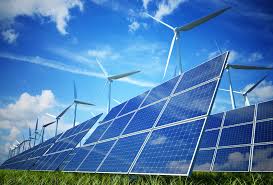An Energy Transition – The country needs to move towards renewable energy, and the manner in which that transition is managed will dictate whether it succeeds.
-Christopher Carroll
Lost in the fervor of this year’s political battles and the haze of a hot summer has been significant debate about the nation’s energy use. However, the implications of this nation’s energy policy are too vast to ignore. The right policy could strengthen the economy; the wrong one could weaken it. The right policy could reduce our environmental impact; the wrong one could do further harm to our planet. The right policy could make us more independent; the wrong one could make us more vulnerable. President Obama and his successor must be willing to engage in an energy debate and steer the country through an energy transition.
The horrific explosion of rail oil tankers that left dozens dead and injured in Lac-Mégantic has restarted a subdued national discussion about fossil fuels in this country. Many people are once again discussing the best way to transport these dangerous but necessary energy sources, while others contemplate the necessity of fossil fuels in the first place.
Andrew Leach, an Energy Economist at the University of Alberta in Canada, explained in an Op-ed for Canadian Business that the fallout of the train disaster is bad news fossil fuel proponents in general. “The fallout from the Lac-Mégantic tragedy,” he writes, “will increase public consciousness of the dangers inherent in transporting oil and oil products” and lead to “increased calls for alternatives to oil rather than alternative means of transporting it.”
These comments come as hydraulic fracturing in America has created a domestic gas boom, pushing the country closer to energy independence while simultaneously lowering (link#4) the price of fuel.
The potential economic benefits of natural gas are vast. A transition towards more natural gas production will mean new American jobs in both the energy production and energy use sectors of our economy. American innovation will be fueled as new uses of the gas are found and technology is transformed to take advantage of the benefits that the cleaner fuel source provides to the environment, the economy, and energy producers (not to mention the opportunity more production affords American fuel exports).
However, environmentalists fear that the dangers posed by “fracking” outweigh the economic advantages. The Natural Resource Defense Fund (NRDC), a non-partisan environmental advocacy group, writes that current policies and techniques have meant that natural gas companies have resulted in “contaminated water supplies, dangerous air pollution, destroyed streams, and devastated landscapes.”
Charles K. Ebinger and Kevin Massy of the Brookings Institution take an in between approach, believing that the short term advantages that new domestic oil and gas present are too strong to ignore. They propose adoption of a “black-gold-green” policy, using and exporting the resources that the country creates while simultaneously developing new alternative fuel technologies and batteries capable of powering the country.
****
Whatever direction the nation, President Obama, and the next president take, it must be decisive and coherent. The environmental ramifications of our dithering energy policies today are grand, while the uncertainty felt by the energy sector and laborers send shivers through the economy.
It is naive to hope that the United States and the world will transition quickly away from traditional fossil fuels like crude oil and coal. As developing countries industrialize and as China and India continue to grow, they will consume increasing amounts of fuel and create alarming amounts of carbon emissions. But, if America plays its cards right, we could lead a transition away from current methods and towards new energy policy while benefiting from the economic rewards. By continuing to export our newfound oil and gas commodities, the country could enjoy the economic rewards of higher exports, new jobs and new innovation while keeping an eye on a more renewable future.
The transition toward a renewable future will reap immediate rewards. The fact that natural gas is cleaner than other fuels, producing 30% less carbon dioxide than crude and 45% less than coal, will mean that the country’s carbon emissions will continue to drop. While coal miners and coal companies will be pushed out of the market, there jobs losses will be accommodated for with new production jobs and the innovation that must accompany new forms of energy.
Meanwhile, new American brainpower must be devoted to solar and wind power and to efficient and powerful ways of storing that energy. Someday, there should be a solar panel on every rooftop. Someday, there should be sophisticated wind-farms on land and sea, able to harvest the natural energy of Mother Nature while avoiding negative impacts on our environment and ecosystems.
Most importantly, President Obama and whomever follows him must not give our nation mixed signals. Our President must decide what direction our nation should take and indicate it with a steady hand. Is it time for a transition away from the old ways and towards new infrastructure and new energy priorities, or is it time to prop-up coal companies and invest in new pipelines and oil fields? The White House’s direction must be clear in the coming years, because if it isn’t, we will continue to shuffle down our current path. Where that path stops is unknown, but it probably isn’t pretty.
Filed under: Energy, Mandate to Debate - policy discussion, Uncategorized | Tagged: Brookings Institution, Coal, Crude Oil, Energy, Energy policy, Fracking, Hydrofracking, Lac-Mégantic, Natural Gas, Renewable Energy, Solar, Wind | Leave a comment »




